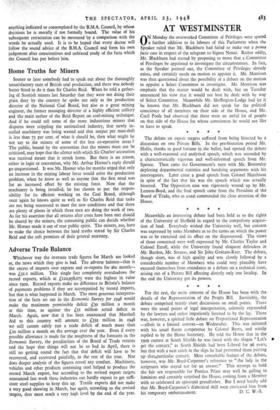Home Truths for Miners
Sootier or later somebody had to speak out about the thoroughly unsatisfactory state of British coal production, and there was nobody better fitted to do it than Sir Charles Reid. When he told a gather- ing of Scottish miners last Saturday that they were not doing their plain duty by the country he spoke not only as the production director of the National Coal Board, but also as a great mining engineer, the former managing director of a highly efficient colliery and the main author of the Reid Report on coal-mining technique. And if he could tell some of the more industrious miners that disputes were crippling the nationalised industry, that newly in- stalled machinery was being wasted and that output per man-shift is less than 75 per cent. of what it should be, then what might he not say to the miners of some of the less co-operative areas ? The public, bound by the convention that the miners must not be criticised, may hope that the silence with which Sir Charles' accusation was received meant that it struck home. But there is no reason, either in logic or convention, why Mr. Arthur Homer's reply should go unquestioned. It was Mr. Homer who for months urged that only an increase in the mining labour force would solve the production problem, when he knew as well as anyone that the first need was for an increased effort by the existing force. Now that the machinery is being installed, he has chosen to put the respon- sibility for its efficient working on the Coal Board, although once again he knows quite as well as Sir Charles Reid that tasks are not being reassessed to meet the new conditions and that there are plenty of places in which three men are doing the work of two. As for his assertion that all returns after costs have been met should be shared by the miners, the consuming public can decide whether Mr. Homer made it out of true public spirit. The miners, too, have to make the choice between the hard truths stated by Sir Charles Reid and the soft promises of their general secretary.


































 Previous page
Previous page